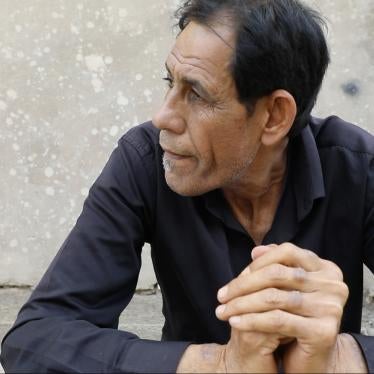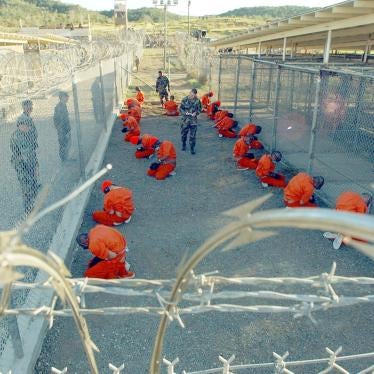Given all the information about abusive interrogations that has made its way out of Guantánamo, the "surprises" over the past week in Salim Hamdan's war-crimes trial – the first military commission convened by the US government since Nuremberg – weren't exactly earth-shattering. But that didn't stop the defense, dubbed Team Hamdan, from doing what it could here to surprise the six-member jury of military officers (plus one sub) tasked with determining Hamdan's guilt or innocence.
The defense team of four lawyers asked the jury members if they knew that Hamdan, who worked as Osama bin Laden's driver and bodyguard, was prodded out of his Guantánamo prison bed in the middle of the night and interrogated by a U.S. agency that could not be named. They asked if the jury was surprised to learn that Hamdan's boss, Abdullah Tabarak, in charge of bin Laden's security detail, including bodyguards and drivers, had himself been detained at Guantánamo Bay but was released and sent home to Morocco in 2004. And they shared with the jury video footage of Hamdan taken soon after he was captured, showing him shackled, hooded and scared, as he was badgered by a U.S. military interrogator and in obvious pain from sitting too long trussed about the legs.
Yet, through it all, it seemed that Team Hamdan could barely solicit a raised eyebrow among the jury members. Maybe such revelations would have shocked a military jury in the past. But the trampling of rights at Guantánamo Bay has so permeated the national consciousness (if not its conscience) that such abuse seems almost commonplace – a simple byproduct of the war on terror that must be endured.
As FBI agent George Crouch, a prosecution witness, said dryly – after learning that apparent CIA interrogations of Hamdan had taken place at night without the knowledge of FBI agents who were questioning Hamdan during the day – "Nothing surprises me these days."
The late delivery of documents
The first hiccup in the trial occurred when the prosecution failed to deliver information the defense had requested weeks ago from the government about Hamdan's "participation" in Operation Sandman, allegedly a program to maintain discipline at Guantánamo but that was suspected to include "enhanced interrogation techniques" such as sleep deprivation. Judge Keith Allred, a Navy captain, had ordered the prosecution to provide the documents to the defense, but they trickled in at a snail's pace, some being released to Team Hamdan only the night before the trial began.
It was perhaps not surprising then that Team Hamdan's leader, Charlie Swift, a former lieutenant commander in the Navy, opened with a sarcasm-soaked contemplation of what he would have done if he'd gotten those 600 pages sooner, by way of requesting more time to analyze the documents. Swift pointed out, for example, "I would have interviewed the guards on Tango Block to determine the exact level of [Hamdan's] sleep deprivation."
The prosecution protested Team Hamdan's request for additional time, but Judge Allred granted it and showed his annoyance with the prosecution by issuing a stern reprimand to the government prosecutors. "The government is in a poor position to get indignant about anything," Allred said. "Good grief, Charlie Brown, what have you been doing?"
Say what?
Allred's irritation at the prosecution was short-lived, however, and was soon turned on the defense, which objected repeatedly to the admission of statements that constituted hearsay.
The rule against hearsay – which excludes as evidence statements not made by the person testifying – is a cornerstone of American criminal justice. If the accused can't directly confront the person who uttered the words in order to probe for and confirm the truth of the statement, then those words can't be used as evidence. While there are many exceptions to the basic hearsay rule, hearsay evidence generally remains prohibited.
Not so with the Guantánamo military commissions. The Military Commissions Act, passed by Congress in 2006, expressly permits hearsay evidence, provided it is "reliable" and "probative" – a standard that renders the hearsay rule meaningless. Allred told counsel outright at the beginning of Hamdan's trial that he will accept any recognized exception to the hearsay rule and any hearsay evidence offered under the "less rigorous standard Congress has provided."
The prosecution therefore felt free to ask one witness, "Did somebody at that time tell you something of significance about the accused?" Posed in such a way, this question is the very definition of impermissible hearsay.
But Team Hamdan became so tired of objecting, to no avail, that they didn't even bother to stand for that one.
The "capture videos"
Watching the two Hamdan "capture videos" was harrowing both for what they depict and for the fact that they were admitted into evidence at all. The videos document Hamdan's interrogations by U.S. military personnel in Afghanistan right after he was taken into custody. It's difficult to know what the prosecution intended to show with these tapes, except maybe that the U.S. military had confidence in the integrity of the post-capture interrogations.
In the grainy black and white film, the videos show Hamdan slumped on the floor, hooded and shackled, as he is badgered by his Arabic-speaking military interrogator in a dark room with one dim light bulb overhead. An armed soldier is behind Hamdan, the interrogator in front.
After removing the hood, the interrogator begins the questioning, only to be interrupted several times by Hamdan, who asks if he can change positions, move his legs and rub his foot. There is a sickening sense in watching that Hamdan – visibly scared – is searching for the right words to appease the interrogator, trying out ideas as they occur to him in an attempt to avoid more abuse.
The defense strenuously objected to the admission of these tapes as evidence. According to military commissions' rules, evidence obtained through torture can't be admitted. But the U.S. government has defined torture so narrowly that it seems almost anything can be admitted into evidence as a product of "mere" coercion.
Although Allred acknowledged in a ruling issued the day before trial that Hamdan was subjected to "various types of coercive treatment," he overruled the objection to the tapes, saying that the rules allow the admission of coerced testimony if it is deemed "reliable" and "the interests of justice." Those tapes, he concluded, served the interest of justice and were allowed in. Never mind the coercion.
Defenders of the military commission process will point to other statements that Allred has excluded from trial, because they were coerced, to argue that the process is fair. But with some evidence admitted that was clearly obtained through coercion, those claims ring hollow.
Although the videos were entered into the record, aired in court, and viewed by those in the gallery, the Department of Defense will not release them to the general public. According to one Pentagon source, the DoD is withholding them out of an "abundance of caution." Perhaps the DoD fears that the American public will know a coercive interrogation when it sees one?
Good cop, bad cop
On day four of the trial, the prosecution called on FBI special agent Dan William. He testified that on Aug. 19, 2002, he interviewed Hamdan at Camp Delta, one of the prisons at Guantánamo Bay. William said that Hamdan was "willing" to talk and the session was "cordial." He noted that he did not read Hamdan his rights, as it was "policy" at the time not to do so for any Guantánamo detainee.
On cross-examination the next day, Team Hamdan offered a secret document into evidence, and while court observers were not able to see the document, we were told it revealed that Hamdan had been rudely awakened at midnight on Aug. 19-20, 2002, and interrogated by "another agency" of the U.S. government – typically a euphemism for the CIA.
Upon hearing this information, William shrugged. Although he had no idea that anyone else had questioned Hamdan at the same time as he did, he told the defense that he didn't think secret midnight interrogations undermined his own daytime "rapport building" efforts.
One of Hamdan's lawyers suggested that there might be some kind of "good guy, bad guy thing going on," with FBI agents "building rapport" during the day and "the other agency" doing things the rough way at night.
Those in the gallery will never know the answer to that. Under an order from the judge, the CIA's name can't be uttered aloud in Hamdan's trial and the secret document is, well, secret.
Dark night
There are other surreal aspects to what happens at Guantánamo Bay. As the first week of proceedings for Hamdan came to an end, trial observers went to see "The Dark Knight" at the military base's outdoor cinema.
The evening was all-American: families with lawn chairs and coolers with beer; public service announcements encouraging the crowd to honor American democracy by mailing in their absentee ballots; the playing of the national anthem; and then the movie.
Needless to say, it was weird to see "The Dark Knight" here. The movie is not a simple "good guys vs. bad guys" tale, but a rumination on the nature of good and evil, every person's capacity for corruption and redemption, and the triumph of basic humanity over self-interest. But the Guantánamo Bay detention facility is itself marred by the rendition, torture and ill-treatment of many of its occupants, and the deeply flawed trials that have commenced here. It is precisely these types of indecencies, committed by those with unrestrained power, that "The Dark Knight" disavows.
Allred was also in attendance at the movie, so I introduced myself to him as an observer for Human Rights Watch. The judge, who clearly takes his responsibilities seriously and is mindful of the historical moment at hand, seemed pleased.
"It's very important that you're here," he said to me.
Yes, that's true, I thought to myself – better to be here than to let the trial go on without anybody from civil society witnessing it.
But I was not glad that either of us was there. A much better place to be would have been on the U.S. mainland, in a federal court, observing a trial that at its essence would be fair, impartial and just. What is unfolding at Guantánamo Bay is something very far from that.








